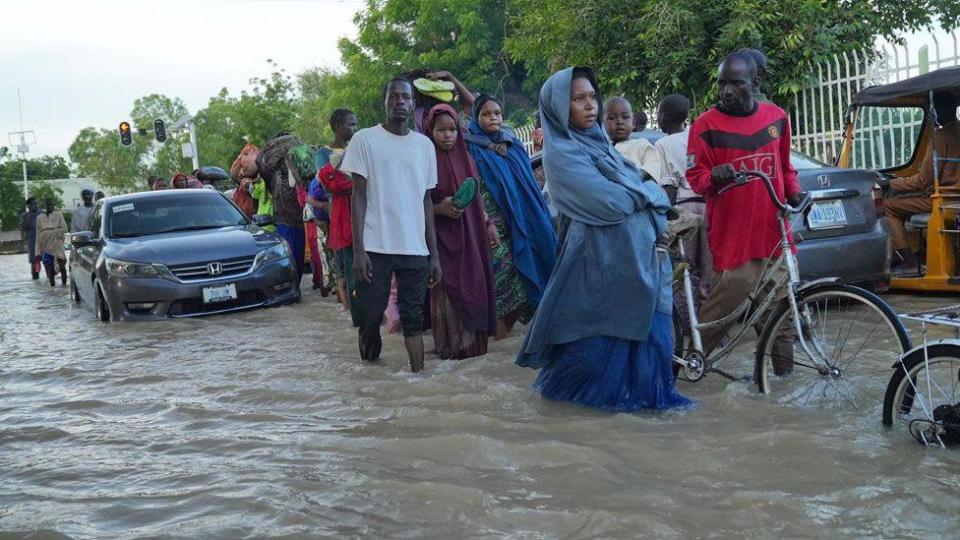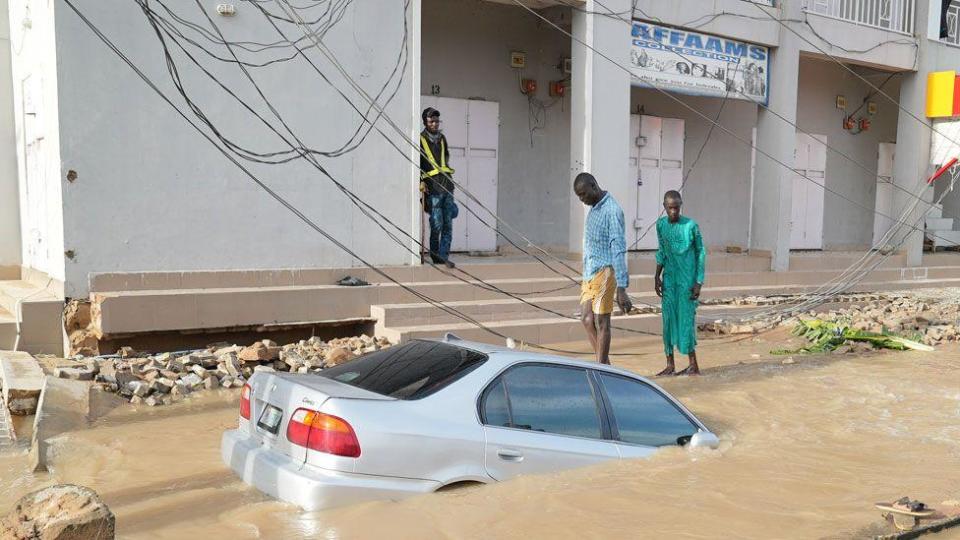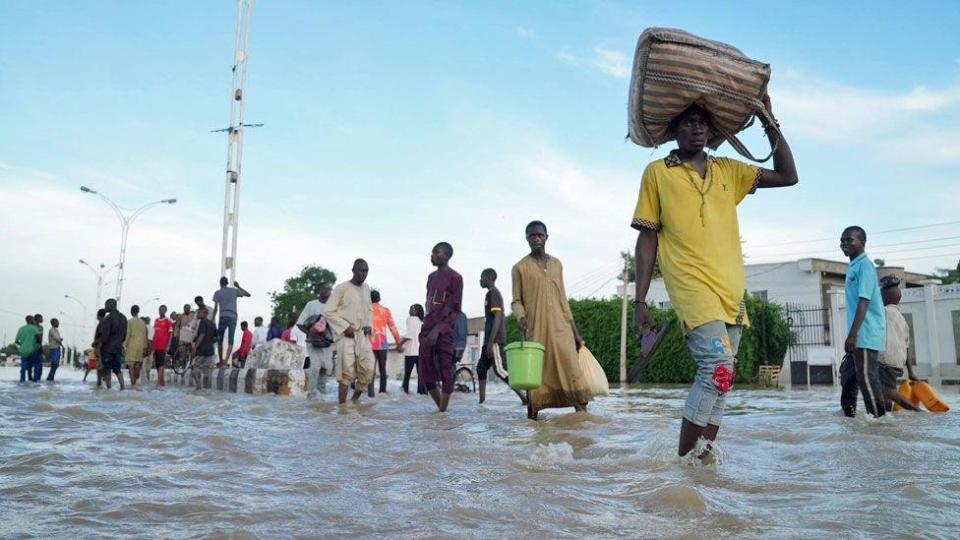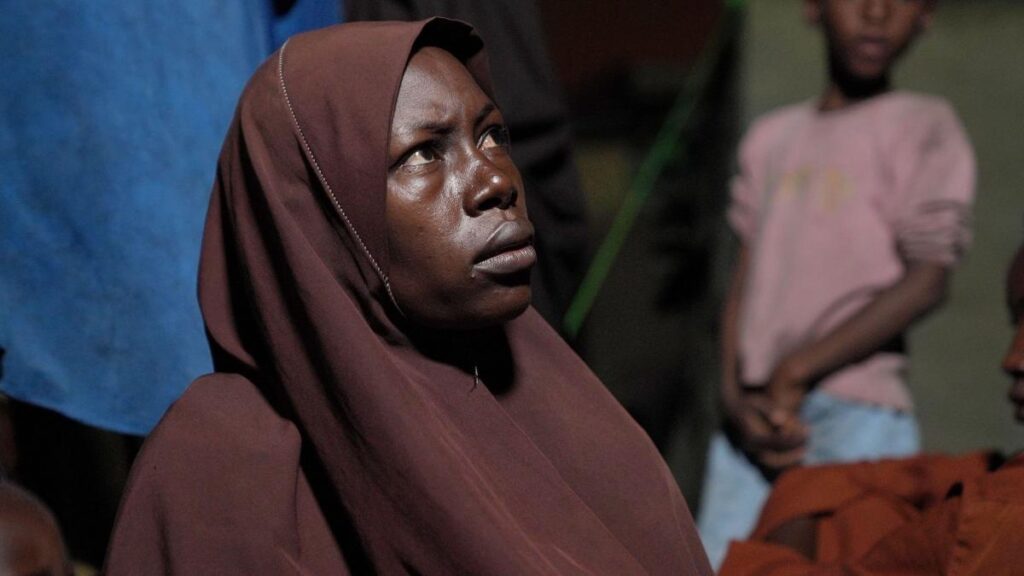Fatima Yakubu can’t believe she and her six children are still alive after a dam collapsed following torrential rains in northeastern Nigeria.
The family, who live south of Maiduguri city near the Alau Dam, were asleep when their house flooded in the early hours of Tuesday morning.
“I woke up at 1am feeling water on my legs,” the 26-year-old told the BBC.
“It rose very quickly and I was so scared. I thought I was going to die with my children.”
She screamed for help in panic: “Some men heard my screams and came to save us. I am grateful to God.”
She and her children have found shelter in Bakassi Camp, one of four centres set up to accommodate the hundreds of thousands of people forced from their homes by floods this week.


Until last year, the camp was occupied by people fleeing the notorious Islamist militants Boko Haram, whose 15-year insurgency has wreaked havoc in a region where poverty is endemic.
Although the jihadists have dwindled in number, they are still active. Despite the closure of refugee camps, Maiduguri remains densely populated and many people prefer the relative safety of these areas to the rural areas of Borno State.
The heavier than normal rainfall began in late August. It is still humid and raining cats and dogs as people try to cope with the aftermath of the collapsed dam.
Residents near the Alau Dam, located about 20 kilometers (12 miles) south of the city on the Ngadda River, grew concerned about the construction as water in the reservoir rose steadily last week and alerted authorities.
A delegation went to inspect the dam but said there was no cause for concern.
But about four days later it began to break and the dam collapsed. Within three hours, water was pouring into Maiduguri as people slept – some estimates suggest nearly half of the city was covered.
Authorities are still working to rescue people, and sometimes bodies, trapped in buildings.
Many public buildings were hit, including hospitals and the prison.
The crisis has been exacerbated by the escape of some wild animals from the state zoo – and an estimated 40% of the animals died.
The Borno State government has ordered that schools, which only recently reopened after a long vacation, remain closed for two weeks.


Hundreds of residents walk through knee-high water on the popular Lagos Bridge, while most vehicles are unable to pass through the large amount of water.
Mothers hold their children tightly as they wade through the streets, trying not to be swept away.
Some young people take advantage of this by going swimming in places where the water is at least 1.2 metres deep.
In some places the water level is starting to recede, but five villages are still under water.
According to the UN and local media, this is the worst flood disaster in Borno state in thirty years.
There are concerns about an outbreak of waterborne diseases as much of the city’s sewage network has collapsed, contaminating water sources.
“The governor has announced the setting up of a special health team to analyse the situation,” Borno state spokesman Abdurrahman Ahmed Bundi told the BBC. “International partners, such as the WHO (World Health Organisation), have promised to support the government.”
Aid agencies say at least 37 people have died, but authorities say it is too early to confirm this estimate.
“We cannot yet determine the number. As for the number of houses affected, we have to wait until the water level goes down,” Sirajo Garba of the National Emergency Management Agency (Nema) in Maiduguri told the BBC.
The state governor, Babagana Zulum, said the floods may have affected a million people.
Hunger is now a major problem for people who have lost their belongings, homes and businesses.
On Wednesday evening, a car pulled up to the gate of Bakassi camp and the driver began handing out loaves of bread to the assembled crowd.
But dozens of people jumped on his vehicle and took everything through the open windows.
“We don’t have enough food and essentials in the camp. People are always running for food,” said Mrs Yakubu, who is responsible for taking care of her children as her husband stays with his second wife.
“My children only shared one plate of food today. They are still hungry, while I haven’t eaten yet,” she said.
The family shares a mat placed on the ground in the open air – no other shelter is available yet. To ward off mosquitoes, she uses her hijab to cover her one-month-old baby.
Like many other families, they have yet to be allocated a place to sleep as more tents are still being set up.
“My son and I only drank kunu (a local drink made from sorghum or maize) today,” 23-year-old Aisha Muhammad told the BBC through tears.
Like many other women in the camp, the most important thing for her is to find something to eat.


Nema said it would soon commence food distribution, complementing what the state government is doing.
The state spokesperson explained that Governor Zulum visited the camp on Wednesday.
“He distributed 10,000 naira ($6; £5) to the head of each household as an immediate emergency package while the government prepares something more sustainable,” Mr Bundi said.
According to Nema, there are currently about 6,000 people in the four camps.
But there are thousands of others who are in urgent need of help: they are sleeping on the roads, under bridges, in trucks and under vehicles.
Some have made makeshift tents with whatever they have at hand, but they do not provide sufficient protection against the persistent rain.
While emergency services are working to clear the flooded city, it is unclear when the damaged Alau Dam will be repaired.
”The reconstruction of the dam is a huge project that the Borno State Government cannot undertake alone. It belongs to the Federal Government,” Mr Bundi said.
Additional reporting by Yūsuf Akínpèlú, Imam Saleh and Gift Ufuoma from the BBC.
You may also be interested in:


Go to BBCAfrica.com for more news from the African continent.
Follow us on Twitter @BBCAfricaon Facebook on BBC Africa or on Instagram at bbcafrica
BBC Africa Podcasts







